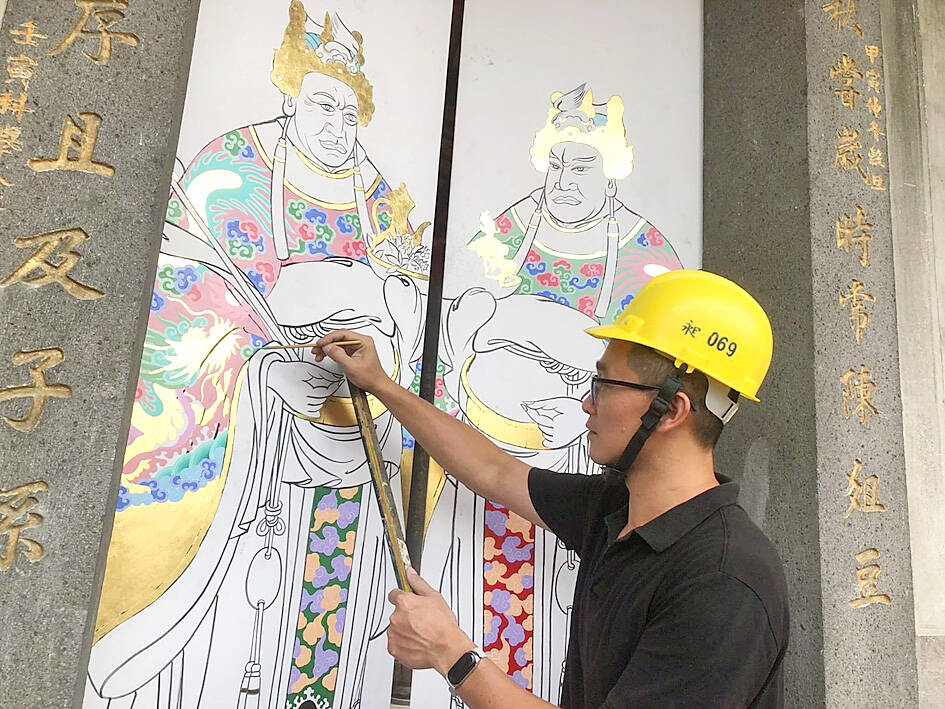The restoration of Hsuehhai Academy, the only surviving Qing Dynasty school in Taipei’s Wanhua District (萬華), is expected to be completed by 2026, with the door gods to be painted by 36-year-old Chou Meng-hsun (周孟勳).
Hsuehhai Academy was built during the reign of Qing Dynasty Emperor Daoguang (道光) (1821-1850) and was later purchased by a local family surnamed Kao (高), who repurposed it as the family’s ancestral temple.
The Taipei Department of Cultural Affairs said it has since 2019 provided more than NT$60 million (US$1.88 million) to renovate and repair the building.

Photo courtesy of Taipei Department of Cultural Affairs
To the best its knowledge, the original door god paintings were the work of Hsu Lien-cheng (許連成) and completed in 1972, the department said.
Hsu’s apprentice and successor, Chen Shu-ken (陳樹根), had been commissioned to restore the paintings, the department said.
However, as Chen is now old and has not practiced the trade for a long time, the original doors would be cleaned and reinforced, and placed on display after the renovations are completed, it said.
The same materials, art style and techniques would be used for the new door gods, but Chou would showcase how artists from different eras treat the same subject, the department said.
Chou is from a new generation of traditional painters officially certified by the Ministry of Culture and would be using techniques such as layering to create visual depth, it said.
Chou on Thursday said that the cloud-like shapes on the clothing of traditional door deities are very fine and require meticulous work, and because of that, he has opted to complete the doors in a traditional fashion, forming a “big” cloud-like shape by drawing little cloud shapes in a small area.
However, Chou said he would add a little flourish of his own.
Traditionally, illustrators favored the symbols representing the head of the dragon, but he would highlight the tail, which in Hoklo is pronounced “tua-bue,” alluding that the Kao family was a significant force to be reckoned with.
“I have aspired to be a professional artist since my final years in college. This is not just a job for me — it is a work of art,” he said.
The managers of the Kao family temple said that few traditional family temples had door deities, but a member of the Kao family had been a Qing Dynasty official, which merited the exception, adding that this was also what made the temple unique.

Snow fell in the mountainous areas of northern, central and eastern Taiwan in the early hours of yesterday, as cold air currents moved south. In the northern municipality of Taoyuan, snow started falling at about 6am in Fusing District (復興), district head Su Tso-hsi (蘇佐璽) said. By 10am, Lalashan National Forest Recreation Area, as well as Hualing (華陵), Sanguang (三光) and Gaoyi (高義) boroughs had seen snowfall, Su said. In central Taiwan, Shei-Pa National Park in Miaoli County and Hehuanshan National Forest Recreation Area in Nantou County saw snowfall of 5cm and 6cm respectively, by 10am, staff at the parks said. It began snowing

Global bodies should stop excluding Taiwan for political reasons, President William Lai (賴清德) told Pope Francis in a letter, adding that he agrees war has no winners. The Vatican is one of only 12 countries to retain formal diplomatic ties with Taiwan, and Taipei has watched with concern efforts by Beijing and the Holy See to improve ties. In October, the Vatican and China extended an accord on the appointment of Catholic bishops in China for four years, pointing to a new level of trust between the two parties. Lai, writing to the pope in response to the pontiff’s message on Jan. 1’s

HOLIDAY EXERCISE: National forest recreation areas from north to south offer travelers a wide choice of sights to connect with nature and enjoy its benefits Hiking is a good way to improve one’s health, the Forestry and Nature Conservation Agency said, as it released a list of national forest recreation areas that travelers can visit during the Lunar New Year holiday. Taking a green shower of phytoncides in the woods could boost one’s immunity system and metabolism, agency Director-General Lin Hwa-ching (林華慶) cited a Japanese study as saying. For people visiting northern Taiwan, Lin recommended the Dongyanshan National Forest Recreation Area in Taoyuan’s Fusing District (復興). Once an important plantation in the north, Dongyanshan (東眼山) has a number of historic monuments, he said. The area is broadly covered by

A Vietnamese migrant worker on Thursday won the NT$12 million (US$383,590) jackpot on a scratch-off lottery ticket she bought from a lottery shop in Changhua County’s Puyan Township (埔鹽), Taiwan Lottery Co said yesterday. The lottery winner, who is in her 30s and married, said she would continue to work in Taiwan and send her winnings to her family in Vietnam to improve their life. More Taiwanese and migrant workers have flocked to the lottery shop on Sec 2 of Jhangshuei Road (彰水路) to share in the luck. The shop owner, surnamed Chen (陳), said that his shop has been open for just